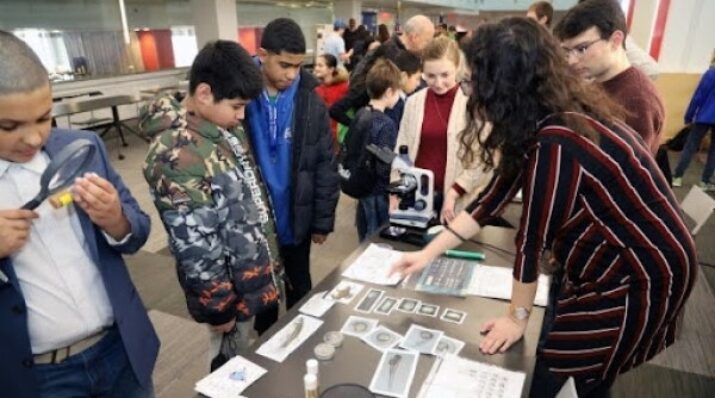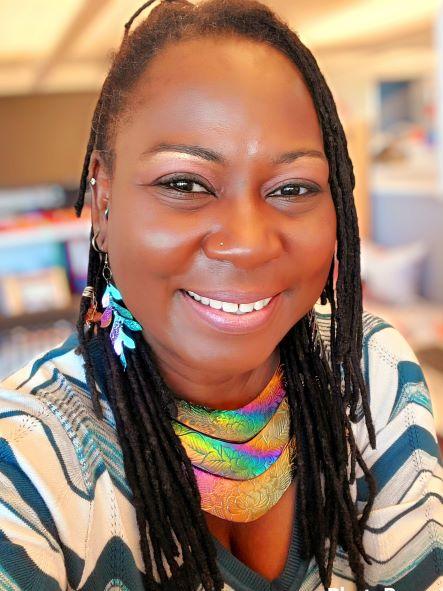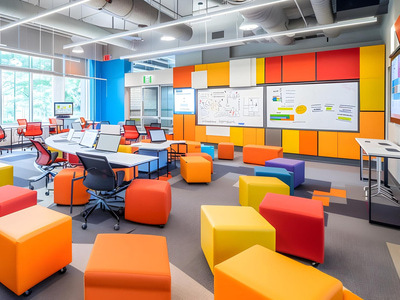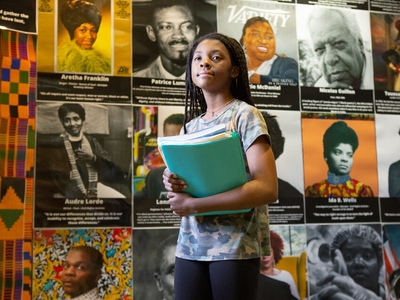New Designs for School
The Power of STEM for Historically Marginalized Students
Topics

We’ve all had the experience of truly purposeful, authentic learning and know how valuable it is. Educators are taking the best of what we know about learning, student support, effective instruction, and interpersonal skill-building to completely reimagine schools so that students experience that kind of purposeful learning all day, every day.
Active engagement from community partners allows the Boston Public Schools STEM Fair to go beyond showcasing student projects to catalyzing broader educational impact and inclusivity.
The Boston Public School community is buzzing with excitement for science, technology, engineering, and mathematics (STEM) these days. Recognizing the transformative power of STEM education, BPS is committed to fostering a love for these fields in all its students, especially those from historically marginalized groups. This commitment shines brightly through initiatives like the annual Boston Public Schools/Massachusetts State Region VI STEM Fair coming up next month, where young minds showcase their innovative projects and connect with inspiring professionals.
The BPS Office of Partnerships helps to plan this event each year and it reminds me why STEM is crucial for the Boston Public School community. Beyond opening doors to exciting careers, a STEM education can equip students with critical thinking, problem-solving, and collaboration skills—fundamental tools for success in any life path. Furthermore, it empowers historically marginalized students to challenge stereotypes, close achievement gaps, and become agents of positive change.
STEM education holds particular importance for historically marginalized students in BPS or any school district due to several intertwined factors:
Breaking Barriers and Expanding Opportunities
- Increased career possibilities: STEM fields offer lucrative and fulfilling careers with high growth potential. Providing more access to these opportunities can uplift marginalized communities and create paths to financial security.
- Challenging stereotypes and biases: Representation matters. Seeing individuals from their backgrounds excel in STEM fields can shatter stereotypes and empower students to pursue those paths themselves.
- Developing critical thinking and problem-solving skills: STEM education cultivates valuable skills like critical thinking, problem-solving, and collaboration. These skills are beneficial in any profession or life pursuit, not just STEM careers.
Addressing Systemic Inequities
- Countering historical exclusion: Historically marginalized communities have been shut out of STEM education and careers due to systemic racism, sexism, and other forms of discrimination. Expanding access helps address this historical injustice.
- Closing the achievement gap: Studies show that STEM education can improve overall academic performance and close the achievement gap between marginalized students and their peers.
- Promoting social justice: By equipping students with STEM knowledge and skills, we empower them to become agents of change, tackle societal challenges, and advocate for a more equitable world.
Building Confidence and Identity
- Seeing themselves in science: When students see scientists, engineers, and mathematicians who look like them, it fosters a sense of belonging and increases self-efficacy in STEM fields.
- Boosting self-esteem and motivation: Succeeding in STEM challenges can enhance self-esteem and motivation, encouraging students to pursue their aspirations regardless of obstacles.
- Developing a critical lens on the world: STEM education encourages questioning, analysis, and critical thinking, empowering marginalized students to challenge dominant narratives and advocate for themselves and their communities.
It created insecurity and discouraged me because I could not see myself in some of the industries and could not see that I could be successful. In other words, representation matters.
I am a proud BPS alum. I recall exploring career options in 10th and 11th grade and being disappointed in the lack of representation of black and brown people in many industries. I also noticed the under-representation of women. It created insecurity and discouraged me because I could not see myself in some of the industries and could not see that I could be successful. In other words, representation matters. There has been dedication and intentionality to change this landscape over time. This is why I’m excited for the STEM Fair. Hosted by the Boston Public Schools' Science, Technology, and Engineering Department (BPS STE) in collaboration with the Center for STEM Education and co-sponsored by Northeastern University, this year—the 78th year!—promises to be a day of discovery, inspiration, and STEM fun.
Last year was the first year the STEM Fair was held in-person since the pandemic. As we continue to push toward normalcy, this year’s fair will also be an in-person event at the Reggie Lewis Center in Roxbury, a historic neighborhood in Boston that is “the heart of Black culture in Boston.” But the fair is not just about student projects (though those are sure to be amazing!). Several partners will be participating in our interactive activity expo. In the activity expo is one of our district’s newest partners, Rooted by Cass, a local gardener with a mission to help the community discover new ways of breathing life into home and work spaces and improving their overall well-being with plants. MassDOT Aeronautics is another BPS partner participating in the expo. They work to make air transportation safer, cleaner, more efficient, and more economically advantageous for the people, communities, and businesses of Massachusetts. Another STEM partner who brings fun and creativity for all is ToysinBox 3D Printing; they have workshops, shows, and events for all ages and encourage learning and project-based engagement.
Partner participation in the fair is valuable to students, because it provides our BPS partners the opportunity to:
- Share their passion for STEM: Whether they are a scientist, engineer, technologist, or simply a STEM enthusiast, our partners can connect to students by sharing their knowledge and love for all things STEM. They can host a hands-on exhibit or demonstration at our expo, a fantastic opportunity to inspire young minds and showcase their organization's work.
- Engage with future innovators: Partners can connect with the brilliant students of BPS, who have been diligently working on their own STEM projects. Partners ask students questions about their projects and encourage them on their scientific journey. Partners are usually amazed by the creativity on display.
- Support a worthy cause: By participating in the expo, partners contribute to the important mission of fostering a love for STEM in Boston's young generation. The presence of our partners shows students the vast possibilities and exciting careers that await them in these fields.
At Boston Public Schools, we believe that all students deserve the opportunity to explore the exciting world of science, technology, engineering, and math. I see the 78th Annual Boston Public Schools/Massachusetts State Region VI STEM Fair as a testament to that commitment. The fair serves as a platform for building relationships between the BPS community and local organizations, strengthening ties and fostering collaboration. I feel that the presence of our partners can attract a wider audience to the fair, encouraging broader participation and promoting STEM interest within the student community and their families. This active engagement allows the Boston STEM Fair to go beyond showcasing student projects and become a catalyst for broader educational impact, inclusivity, and program sustainability.
As amazing as the STEM Fair is, providing opportunities that simply increase access to STEM education is not enough. We must also dismantle systemic barriers, provide inclusive mentorship, and create culturally relevant learning environments that celebrate diversity and encourage innovation. It’s a big lift, but when these conditions are met, STEM education can be a powerful tool for empowering historically marginalized students, breaking down barriers, and creating a more just and equitable society.
Photo at top courtesy of Northeastern University Center for STEM Education




